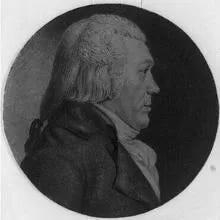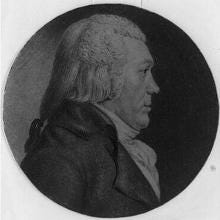This is an installment of “Sestercenntenial Moments,” marking the 250th anniversary of the American Revolution and its memory in our national life. For more on the background of the series, see here.
In July of 1774, 33-year-old Nathaniel Niles was in Newburyport, Massachusetts. A native of Rhode Island, Niles had attended Harvard, graduated from the College of New Jersey (we know it at Princeton), and had worked as a minister in Connecticut, though he hadn’t settled into a pulpit. But he was an active writer and preacher, and deeply immersed in the issues of the day. Niles would go on to become the first member of the House of Representatives representing the new state of Vermont when it was admitted to the Union in 1791.
That July 250 years ago, there was a lot of talk all over North America about freedom, and tyranny, and rights. And there was a lot of such talk from Niles, too. However, he had something more specific in mind as he spoke to his Congregationalist audience in Newburyport:
God gave us liberty, and we have enslaved our fellow men. Would we enjoy liberty? Then we must grant it to others. For shame, let us either cease to enslave our fellow men, or let us cease to complain of those who would enslave us. Let us either wash our hands of blood, or never hope to escape the avenger.
In July of 1774, enslavement was a fact of everyday life in all thirteen British colonies. It wasn’t a fact in exactly the same way, though. In New England, slaves were relatively sparse and were typically tasked with household labor. Elsewhere, whether in the grand estates of the Hudson Valley or the rice or indigo plantations of South Carolina, they were part of larger regimented workforces and a significant proportion of the population. Unlike the eve of the Civil War, when slavery was defended as a positive good by those most invested in the institution, virtually all white people, North and South, viewed it as a necessary evil at best. Like the burning of fossil fuels or the wealth of Wall Street bankers, the phenomenon was widely regarded as wrong but impossible to prevent, at least in the short term.
But that didn’t stop people from trying. Massachusetts, Connecticut, and Rhode Island banned the importation of slaves in 1774. Pennsylvania imposed a high tax to discourage it. More strikingly, Virginia and North Carolina, two colonies deeply invested in the practice, also put importation bans into place.
There was less to this than met the eye. There had been a massive influx of enslaved people earlier in the decade, so the market was flooded. And of course Georgia and South Carolina, the colonies with the largest enslaved populations, were chary of any threats to their economies.
Still, bans would remain an important feature of colonial politics in the First and Second Continental Congresses of 1774/5, and before the Revolution had ended, the practice had been abolished in all the New England states. There was a sense that slavery was on the road to extinction even before the American Revolution, and that feeling intensified in the years afterward.
We know how this story ended: slavery would intensify before it was finally abolished. And we know why, a reason most pithily expressed by socialist and novelist Upton Sinclair a century and a half later: “It is difficult to get a man to understand something when his salary depends on his not understanding it.” Difficult, but not impossible. The day after that Niles sermon in Newburyport, a member of the congregation freed his slave the next day.
Later in 1774, bearing a letter of introduction from Benjamin Franklin, Thomas Paine landed in Philadelphia. Paine would soon become famous as the author of the famed pamphlet Common Sense, which would be published in early 1776. But in one of his first published essays, probably written in 1774 but published in 1775, Paine attacked American slavery. “That some desperate wretches should be willing to steal and enslave men by violence and murder for gain, is rather lamentable than strange,” Paine began with typical directness. “But that many civilized, nay, christianized people should approve, and be concerned in the savage practice, is surprising; and still persist, though it has been so often proved contrary to the light of nature, to every principle of Justice and Humanity.”
Thomas Paine’s relationship to Christianity has long been regarded as vexed (and indeed it may be notable here that “Justice” and “Humanity” get capitalized while “christianized” does not). But he recognized that noting hypocrisy may be one lever in getting people to understand something when their salaries depend on not understanding it. And that while slavery had been practiced for thousands of years all over the world, Christianity—which posits the radical equality of all souls, regardless of circumstances—was a powerful tool in a fight against a powerful adversary.
As a member of Congress from Vermont, Reverend Nathaniel Niles cast a vote against the Fugitive Slave Act of 1793, which required the return of escaped slaves to their enslavers. The bill passed and was signed into law by President George Washington (who was on a bit of an abolition journey of his own, as he would make plans to free the enslaved people of Mount Vernon). As Martin Luther King, Jr. liked to say, the arc of the universe is long. We live in the faith that it bends toward justice.



